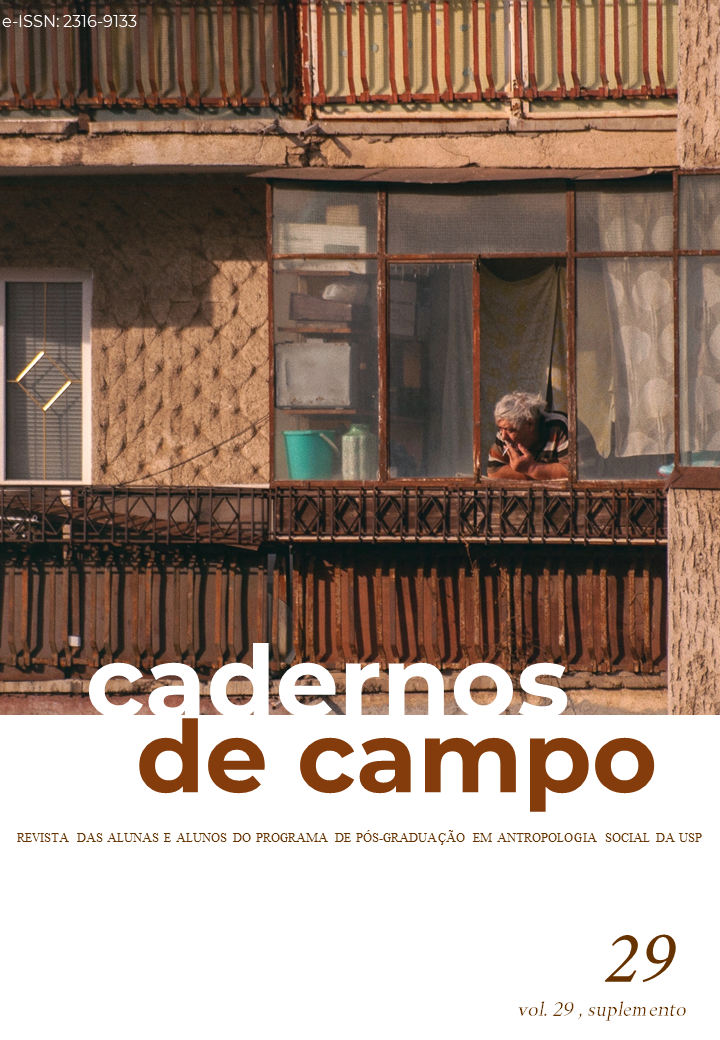Ethnographing and intervening
report of an engaged anthropology
DOI:
https://doi.org/10.11606/issn.2316-9133.v29isuplp216-224Keywords:
Engaged anthropology, COVID19, Immigrants, Refugees, HealthAbstract
Engaged ethnographies are not new to anthropology. In times of the COVID-19 pandemic, in which the ethnographic exercise becomes, at times, prohibitive, other ways of acting are presented to anthropologists, whose job presupposes their insertion in networks of native relations. The transit through these networks, undertaken ethnographically, becomes useful to address problems presented by research interlocutors in the situation of vulnerability. In this brief report, I present my experience of engaged anthropology with immigrants and refugees in the city of São Paulo. It highlights the experience with migrants living in the municipality of Guaianases and my performance in the Health Care Network for Immigrants and Refugees. Finally, I argue that ethnography is a politically implicated activity, and that addressing problems presented by our research interlocutors are not filigree of the anthropologist's work, and locate him in this network of relationships in which he is inserted, evidencing their agencing by research subjects.
Downloads
References
ABA – Associação Brasileira de Antropologia. (2012). Código de Ética da Antropóloga e do antropólogo. Brasília: Associação Brasileira de Antropologia.
BRANCO PEREIRA, Alexandre. (2019). Viajantes do tempo: imigrantes-refugiadas, saúde mental, cultura e racismo na cidade de São Paulo. 175f. Dissertação de mestrado em Antropologia Social – Universidade Federal de São Carlos, São Carlos.
BRANCO PEREIRA, Alexandre. (2020a). Viajantes do tempo: imigrantes-refugiadas, saúde mental, cultura e racismo na cidade de São Paulo. Curitiba: Editora CRV.
BRANCO PEREIRA, Alexandre. (2020b). “Imigrantes, refugiados e o novo coronavírus: notas para a reflexão”. Boletim Cientistas Sociais e o novo coronavírus, n. 66 – ANPOCS, p. 1-4. Disponível em http://www.aba.abant.org.br/noticia-88999
FAVRET-SAADA, Jeanne. (2005). “Ser afetado”. Tradução de Paula Siqueira, revisão de Tânia Stolze Lima. Cadernos de Campo, n. 13, pp. 155-161.
FELDMAN-BIANCO, Bela. (2018). “O Brasil frente ao regime global de controle das migrações: Direitos humanos, securitização e violências”. Travessia - Revista do Migrante, Ano 31, n.83, pp. 11-36.
FONSECA, Claudia. (1998). “Quando cada caso NÃO é um caso: pesquisa etnográfica e educação”. Trabalho apresentado na XXI Reunião Anual da ANPEd, Caxambu.
KIRSCH, Stuart. (2018). Engaged Anthropology. Oakland: University of California Press.
KIRSCH, Stuart. (2010). Experiments in engaged anthropology. Collaborative Anthropologies, v. 3, p. 69-80.
LOW, Setha; MERRY, Sally. (2010). Engaged anthropology: diversity and dilemmas. Current Anthropology, v. 51, Supplement 2, pp. S203-S226.
MACHADO, Igor José Renó. (2019). “Ethographic life: method for an ex post facto anthropology”. Anthropologica 61, pp. 345-351.
PRECIADO, Paul B. (2020) “Aprendiendo del virus”. El País, 28 de março de 2020. Disponível em https://elpais.com/elpais/2020/03/27/opinion/1585316952_026489. html acesso em: 21/05/2020.
SANCHES, Mariana. (2020). “Coronavírus: nos EUA, cidades com migrantes brasileiros e hispânicos têm 30% mais mortes por COVID-19”. UOL Notícias, 19 de abril de 2020. Disponível em: https://noticias.uol.com.br/ultimas-noticias/bbc/2020/04/19/nos-eua-cidades-com-migrantes-brasileiros-e-hispanicos-tem-30-mais-mortes-por-covid-19.htm acesso em: 29/05/2020
Downloads
Published
Issue
Section
License
I authorize Cadernos de Campo Journal of Anthropology to publish the work of my authorship/responsibility, as well as I take responsibility for the use of images, if accepted for publication.
I agree with this statement as an absolute expression of truth. On my behalf and on behalf of eventual co-authors I also take full responsibility for the material presented.
I attest to the unpublished nature of the work submitted
How to Cite
Funding data
-
Coordenação de Aperfeiçoamento de Pessoal de Nível Superior
Grant numbers 001





